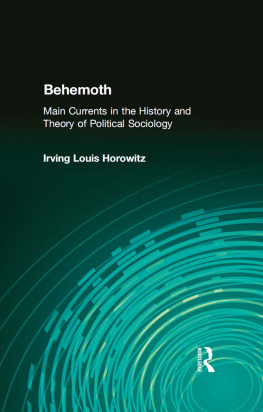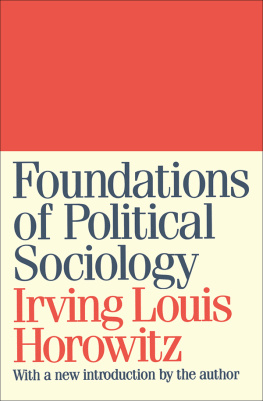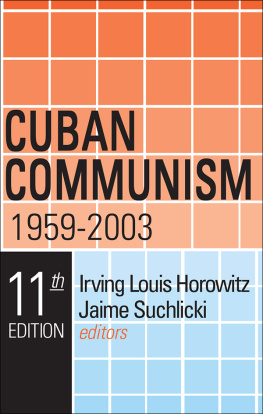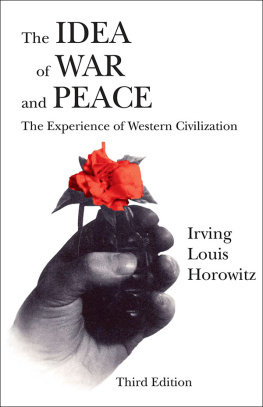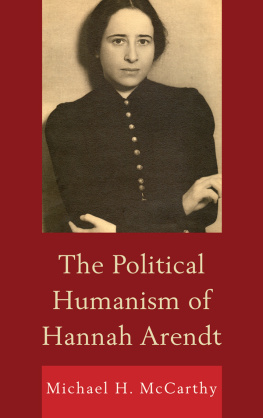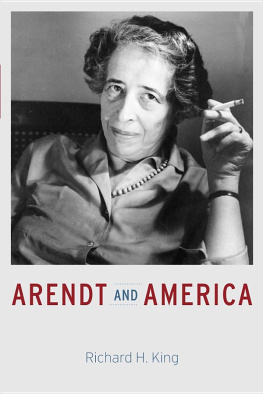First published 2012 by Transaction Publishers
Published 2017 by Routledge
2 Park Square, Milton Park, Abingdon, Oxon OX14 4RN
711 Third Avenue, New York, NY 10017, USA
Routledge is an imprint of the Taylor & Francis Group, an informa business
Copyright 2012 by Taylor & Francis.
All rights reserved. No part of this book may be reprinted or reproduced or utilised in any form or by any electronic, mechanical, or other means, now known or hereafter invented, including photocopying and recording, or in any information storage or retrieval system, without permission in writing from the publishers.
Notice:
Product or corporate names may be trademarks or registered trademarks, and are used only for identification and explanation without intent to infringe.
Library of Congress Catalog Number: 2011041482
Library of Congress Cataloging-in-Publication Data
Horowitz, Irving Louis.
Hannah Arendt: radical conservative/Irving Louis Horowitz.
p. cm.
ISBN 978-1-4128-4602-8 (acid-free paper)
1. Arendt, Hannah, 1906-1975Political and social views. 2. Political sciencePhilosophy. I. Title.
JC251.A74H67 2012
320.5dc23
2011041482
ISBN 13: 978-1-4128-4602-8 (hbk)
Politics was the engrossing occupation of Hannahs lifeHer fondness for the art of foundation, and the political geniuses who framed new sets of laws perhaps reflects the importance she gave in her general thinking to beginning and beginners, to man as the animal capable of incessant novelty, of being born new each time as unique individual, in the repetitive pattern of species life.
Mary McCarthy
This statement derives from a lecture first presented at a multiuniversity conference in New York in October 1981, published in Partisan Review:The 50th Anniversary Edition, edited by William Phillips, 1984.
The eight essays or essay-reviews, compressed into eight chapters, were written over a span of many decades. They may not add up to a full-bodied effort at critical analysis or intellectual biography, but they provide a perspective on the work of Hannah Arendt from political science, or, if preferred, a normative or philosophical standpoint. What prompts publication at this time is the continuing interest in her works, but no less, the bitter and at times highly emotive response to Arendts leben even more than her werke by serious scholars.
Some of the more personal invective addressed at her rather than to her came well after her death. I am confident that were she still in this world, her critics would have been answered with the sharp edge and brilliance that Hannah uniquely possessed. But because of her departure from this world, and yes, the honorary rather than honorific attachment of her name appended to mine, I feel a responsibility to remind her crusaders and critics alike that with emoluments come responsibilities. This set of essays is an effort to discharge the latter in good faith.
What follows are the places of the original publication of these eight essays and review-essays, in each case, often with modest cosmetic surgery and duplications omitted. So it would be wrong to claim that these essays were untouched or perfect in their preservation, but no less improper to deny the source of original publicationby worthy journals, issued with the courage and quality of fine editors that make good journals a necessary blessing even in the world of Internet rush to judgment.
It should be noted that when references or citations are made in the context of reviews or review-essays to specific works of Arendt, they are to the work under chapter consideration. If references are to other works, these will be cited. Publications differ widely in their habits of citation, and while I have made a good faith effort to track down the original page sources, this has not always been feasible, But even the most conscientious of readers will be able to distinguish by quotation marks where Hannah Arendt leaves off and where my commentary begins in each chapter.
With respect to specific individuals I want to make special acknowledgments to a number of people who have been exceptionally diligent in helping me convert this cluster of essays into something resembling a book worthy of being read. My translator, Ms. Stephanie Singh, has been extremely valuable in the conversion of English to German. She not only was diligent in indicating repetitions and inconsistencies, but worked very hard to provide German language versions of Hannah Arendts writings, and the pagination to those editions.
By the same token, and with the proper severity and exactitude of a scholar in her own right, Martha Friedenthal-Haase, of Boston University, examined both the English and German language versions. She indicated what changes merited attention in order to maintain the textual flow, narrative sense, and best ways of giving the manuscript the sort of consistency that is hard to maintain in materials that span fully thirty-five years. Her scholarship itself has served as a guide book to the final preparation of my effort.
A special note of appreciation is due to Dr. Rafael Huntelmann, the publisher and director of Ontos Verlag. This book represents a new development for him and his house. While Ontos has established itself as a major force in the publications of analytic philosophy in English, this is its first venture in actual translation into German. That Rafael has seen fit to move in a new and costly direction at a time of great peril in the industry and high personal risk is a matter of pride and concern. May this work be the first of many such projects for a fine publisher.
Finally, this process throughout has benefited from the fine editorial hand of my wife, Mary Curtis Horowitz. Her sharp sense of what I wanted to accomplish in this long-brewing work and, no less, her deep appreciation for my own sense of literary craft no less than intellectual missions can hardly be done justice in a brief statement. To summarize matters succinctly, her steady barrage of questions made it possible for me to treat the work of Hannah Arendt as a badge of honor, and at the same time, not disappoint those who also expect the best from me in critical evaluation.
Let me add that I take full responsibility for shortcomings and infelicities in the text. Often these are gratuitous conclusions in acknowledgment by authors simply to ward off lines of formal criticisms. In my case, it a genuine obligation that an author must assume for a work based upon essays and reviews that date back thirty-five years and then some.
Irving Louis Horowitz
Princeton, New Jersey
November 20, 2011
Sources of Original Publications
Chapter 1: Assaulting Hannah Arendt
First Things (Institute on Religion and Public Life), February 2010, Whole No. 200, pp. 2833.
Chapter 2: Hannah and Heidegger
Society, Vol. 33, No. 4, MayJune 1996, pp. 7478; Once More into the Tangled Web of Emotions and Politics. Society, Vol. 47, No. 4. JulyAugust 2010, pp. 36162.
Chapter 3: Hannah Arendt: Judicial Critic of Totalitarianism
Modern Age, Vol. 39, No. 4, 1997, pp. 397403.
Chapter 4: The Revolutionary Experience in France and America
American Journal of Sociology, Vol. 69, No. 4, January 1964, pp. 41921; also extracted from the


